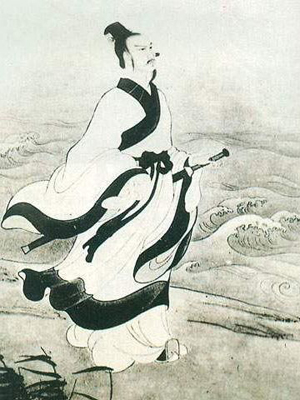Qu Yuan
( chinadaily.com.cn )
|
|||||||||
In memory of this great patriotic poet, people made it a custom that on the day of his death, the fifth day of every fifth lunar month,dragon boat racewould be held and people should eat Zongzi (pyramid-shaped dumplings made of glutinous rice wrapped in bamboo or reed leaves), which is the glutinous rice ball wrapped up with bamboo or reed leaves. The tradition is still kept up to now, called theDragonBoat Day.
In the course of his banishment, he produced a great many poets, expressing his concerns about the country and his detestation toward the treacherous persons. He was the first great patriotic poet in the history of Chinese literature. He composed 25 poems including"Sorrow after Departure (Li Sao),""The Nine Songs (Jiu Ge)(11 pieces),""Asking Heaven (Tian Wen)," "The Nine Elegies (Jiu Zhang)(9 pieces)," "The Far-off Journey Divination (Yuan You)," and "The Fisherman (Yu Fu)." "Sorrow after Departure"is Qu Yuan's classic work, which is also the earliest long lyric poem in China. The poem resolutely uncloaks the repulsiveness of the ruling class by deploying a series of metaphors, and at the same time portrays some upstanding models who adhere to justice, are unafraid of persecution, and very devotedly serve their country and people.
Sorrow after Departureis a romantic lyric poem with a measured realism. The poet uses a great deal of exaggeration in portraying characters and describing objects. The assemblage of fairy tales further enhances the poem's romantic flavor.
Metaphors are lavishly laid out in the poem. For example, a fragrant plant is compared to people's uplifting qualities; the love between a man and woman is likened to the relationship between an emperor and his subjects; and the reins of a horse akin to the management of a country. The form of "Sorrow after Departure" comes from its origins in local oral traditions, and its very concise language echoes the many dialects of the Chu Kingdom.
As the first known great poet in China, Qu Yuan has been called the father of Chinese poetryand has become, in the opinion of some, a national culture hero.

